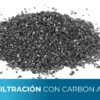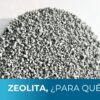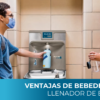Water treatment systems and supplies
Manufacturing and production industry | Water treatment equipment and supplies
Drinking water for the manufacturing and production industry needs to comply with physical, chemical and biological parameters in order to care for the equipment and machinery of the production line or as an ingredient in cosmetic products, food, paints, beverages. Also for product or raw material washing. The most common parameters include pH, conductivity, turbidity, hardness, residual chlorine and heavy metal content.
To reach the required quality, various water treatment equipment is used, including:
- Disinfection: to eliminate microorganisms and ensure water free of pathogens and water viruses.
- Filtration: to remove solid particles, improve water clarity, recirculate water for cleaning and remove accumulated solids.
- Adsorbents: Activated carbon to remove impurities and improve water taste and odor.
- Reverse osmosis treatment systems: to remove some unwanted heavy metals, salts and minerals from water. Water requiring demineralization for the production of inks or electronic components.
- Neutralization: to adjust the pH of water to an optimum level for industrial use.
It is important to note that the type of equipment to be used depends on the quality of the water at any given time and the specific requirements of each industry.
Drinking water for the manufacturing and production industry, as an input and ingredient
Water is an important raw material and ingredient in the manufacturing industry. Drinking water quality is determined by measuring hardness, dissolved solids concentration, turbidity and chemical properties, among other things. Therefore, it is necessary to ensure that its products are manufactured with high quality water.
Water for the manufacturing industry
You may be surprised to learn that water is used in the manufacturing industry as a raw material, ingredient and wash in the production process. Therefore, water quality must meet physical, chemical and biological parameters.
Water for washing raw materials or products
Water is used to wash raw materials and products. Some examples:
- Water for washing raw materials or consumables
- Water for washing products
- Maintenance of equipment and machinery
Water for cosmetic products, food, beverages, paint, skin care.
Water has many uses. Water is used in the manufacturing and production industry as an input or ingredient in products, cosmetics, food, beverages, paints, cleaning products. It is also used to wash products or raw materials and in the manufacturing process itself. Water can be found in shampoo or toothpaste.
Drinking water treatment equipment
Industrial food and beverage production requires a lot of water. In the manufacturing industry, it is important to ensure that clean drinking water is available to your employees at all times. This means ensuring that they have access to safe drinking water when they need it. To do this effectively, you will need some type of drinking water treatment system installed in your factory or plant.
Today, there are different drinking water treatment systems on the market:
– Drinking water disinfection
Disinfection is a process that uses chemicals or other physical or biological agents to destroy microorganisms (such as bacteria, viruses, fungi and protozoa) present in water. It also involves the use of chlorine or iodine compounds, as well as ozone gas, which kills bacteria and viruses in the water supply prior to consumption by humans or livestock, such as cattle or pigs.
Disinfection can be achieved by active or passive means. Active disinfection uses chemicals such as chlorine and ozone gas to disinfect water at the point of use. Active systems are typically used for large-scale applications, such as utilities and hospitals, where high levels of microbial contamination are expected; however, they are also used in smaller environments, such as schools and office buildings, if there is reason to believe that pathogens may be present (e.g., if children with diarrhea come to school). Passive systems do not require electricity, but rely on ultraviolet light from natural sunlight or artificial sources such as LEDs when sunlight is not available.
– Drinking water filtration
Filtration is the most common method of water treatment. The purpose of filtration is to remove suspended particles and microorganisms from the water, as well as dissolved materials. This can be done using sand, activated carbon or membranes.
– Adsorbents for drinking water treatment
The adsorption process is one of the most widely used methods to remove contaminants from water. It involves the use of adsorbents, which are substances that attract and retain contaminants in a liquid solution. Adsorbents can be used to remove specific contaminants or to purify water by removing all types of organic materials and metals.
– Reverse osmosis systems for the treatment of drinking water
Reverse osmosis is a water treatment process that uses pressure to pass water through a semi-permeable membrane. This removes salts, minerals and other contaminants dissolved in the water. Reverse osmosis can be used for drinking water treatment and for industrial applications such as brackish water, seawater and wastewater treatment.
The basic idea of reverse osmosis is simple: if you put something between two liquids with different concentrations of dissolved solids (such as salts), it will tend to move from one side of the barrier to the other by pumping pressure (in natural osmosis the water must be balanced on both sides of the membrane) but in reverse osmosis it does not act like that, due to the artificial pressure factor that pushes the water to pass through it.
– Neutralization treatment to achieve the required quality
Neutralization is the process of adjusting the pH value of water. It consists of adding acids or bases to neutralize the existing acidity or alkalinity and reach a neutral pH value. Different types of chemicals are used for this purpose, such as calcite or celite, sodium carbonate, potassium hydroxide (caustic potash), etc., depending on what is to be achieved with the neutralized water system.
Inevitably, good quality drinking water is needed in all types of manufacturing and production processes.
In the end, it is important to remember that drinking water is an input and an ingredient in all types of manufacturing and production processes. It cannot be ignored or overlooked. If you are looking for quality drinking water solutions for your business, contact us today.
In conclusion, it is clear that drinking water plays an important role in all types of manufacturing and production processes. It is not only an input or ingredient, but also an essential part of the process itself. Therefore, it is necessary to ensure the availability of good quality drinking water at all times.







